You Become Those with Whom You Associate
Just as you are the sum of the people closest to you, you and your family members influence one another both now and in the future.
Today, I’ll talk about how our children are affected by how moms treat and view their own bodies as well as how they relate to their daughters. As I am female and have daughters, this will be slanted towards mothers and daughters.
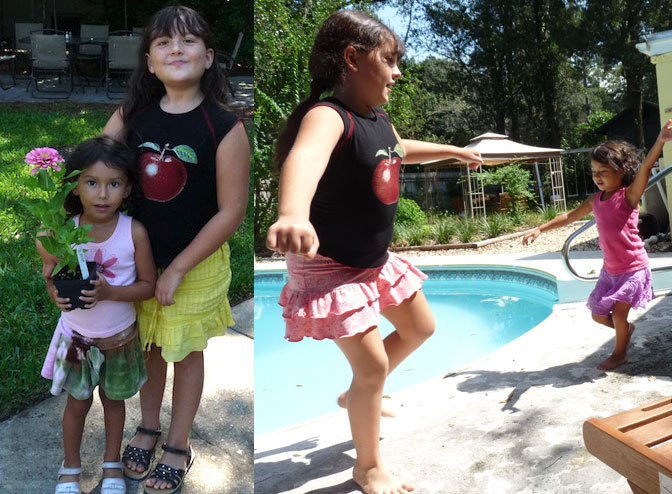
My beautiful girls before I began my transformation
Mothers and Daughters Have a Special Relationship
Your mother’s influence shapes you well past childhood.
In listening to the Venus Index podcasts, I’ve noticed this theme a number of times. Some of the contest winners reveal in their interviews that their mother started discussing dieting when they were very young. Others, myself included, are concerned with helping our daughters grow up to be a healthy size and maintain excellent self-esteem.
How do you predict the future results of actions taken today?
Clearly moms have the best intentions but it doesn’t always come out the way we’d hoped.
Here are a few interviews where the moms discuss how transformation is a family affair.
- While Rhonda was busy winning the VI Open Level I contest, her son was busy winning a contest with the AI workouts!
- Terry’s mom put her on diet pills as a child!
- Brooke and her mother dieted together from very early in Brooke’s childhood and Brooke was left feeling she’d lost control of food and had to keep this unhealthy cycle for life.
- Elisa began her transformation by not being completely forthcoming with her kids and eventually, when Elisa chose to come clean that she was using ESE, was not completely surprised to learn her daughter had realized what was going on.
My mother made a brave effort to overcome the misconceptions and poor body image her mother bestowed upon her: a super human effort, really, considering how she was raised.
She unintentionally led me astray with some misconceptions about appropriate measurements; she taught me that measurements didn’t correspond to height so I always assumed I should have the exact same measurements as a much shorter woman.
It wasn’t until I discovered Venus Index that I found out that ideal measurements are directly linked to height. She also led me to believe food was something over which we had no control.
I grew up in a home with a locked box and learned to binge and sneak food very early on. I was forced to choke down abhorrent meals that someone else deemed suitable (or sneak them into the trash when everyone finally gave up waiting for me to finish) and was the self-pronounced “World’s Pickiest Eater” until well into my teens.
As women, as daughters, as mothers, we are aware and noticed perhaps more than men. While mothers wish the best for their daughters, there are always choices to be made and it can be decades before how we did is revealed. As my mother did, I tried to learn from the mistakes of the previous generation.
We are all, hopefully, doing the best we can.
Stealth Fat Loss: Is It Possible? Is It Right?
In Elisa’s case, she felt it was the best choice to go stealth with the methods she was using to reduce body fat.
After checking in with herself, she realized that it was actually best to be honest and forthcoming. While her son was apparently indifferent, her daughter was happy to have this topic brought into the light because she had indeed observed what was going on and not discussed.
Like Elisa, I have had to tread carefully on this topic.
While we do not necessarily need to share every aspect of our adult lives with our children, nor would it be to their benefit, to what extent is it wise to keep a process such as a physical transformation from them?
- How does our transformation process affect those to whom we are close, regardless of whether we are open and forthcoming, or not?
- How does our own attitude about the process affect our daughters?
- How did our mothers’ attitudes about their bodies and relationship with food affect ours?
I would argue that these issues are critical to shaping who girls become as women and being honest and open will only serve to help our daughters in the long run.
As someone who is always checking out to the long-term repercussions, I thought it would be wise to check in with friends.
It turns out this is a VERY touchy area indeed.
Many women are struggling with body image issues stemming from decisions their parents made in the best interest of their kids, or so they believed, decades ago.
I have never been shut down so quickly on any topic!
I’d add discussing the weight of girls to religion, politics and money as taboo!
Yet I persevere!
The research I did was no more enlightening. All I learned was that growing bodies need calories but no one is quite sure how many and that during the years a girl is developing into a woman and starting to menstruate it is no time to even consider doing anything so risky as cutting calories.
All the online calorie tracking software is for adults. It seems that if you find yourself in the unfortunate position of having a child who wants to slim down, and who should, you are going to have to go it alone. (As a side note, as women, we are also informed that during pregnancy and nursing it is not safe to consider cutting calories. Again, most people do not want to risk touching this subject.)
You Can’t Control Your Children, You Can Only Influence Them
When I became a mother, I was shocked to find myself unable to control my older daughter’s weight.
It didn’t help that I didn’t yet have the right information. When I was informed by a doctor at her 5th birthday checkup that she had an “excess of adipose tissue” and that I should cut the junk food, I was not amused. While it was clear to me that she was overweight, she’s never actually eaten junk food and it was so much harder than the idealistic mother of imaginary children that I used to be could ever have foreseen to reduce her body fat.
It certainly did not help that I had also become fat and exhausted and was still operating under the misconception that exercise was the key to fatloss. I felt a total failure as a parent since I didn’t have the energy to move with her and I did know enough to realize I needed to set the example.
Lead by Example
Sure enough, when I started incorporating exercise into our lives on a regular basis, my husband and kids indeed followed suit!
So great, right?
Only the unfortunate results were underwhelming. As our diets did not address our caloric overages, we didn’t get where I expected. Also, I noticed both flattering and not so flattering mirrors of my actions.
Some of my earlier diet attempts before I got the right information involved cheat days.
These quickly turned into a full-blown family fiasco!
Once I began calorie counting, my daughter was very interested and I was at a loss as to what to tell her. The most important message I could give her is that she is beautiful and that I love her, right?
But on the flipside, dishonesty does not serve and I have to admit I wanted to find a way to support her to safely slim down while still growing.
How do you answer your daughter truthfully when she asks if she is fat?
What do you do about the series of emotions visible on your face before answering, “You’re beautiful and I love you”?
She noticed, of course.
How could she not?
She is female and we know from an early age the importance of appearance.
Does she dismiss your answer?
Is it best to say more or leave it at that?
What do you do when your daughter announces that she is fat.
How do you help and guide her when she sees that you are making changes and she asks you what she can do to change her body?
Being Lean Is Not the Only Goal!
It’s not all roses with my younger daughter, by the way.
Although she is naturally lean and strong, she could give me a run for my money for that “World’s Pickiest Eater” title. I thought she’d outgrow it. She will announce that she’s “not hungry” one bite into a meal.
We notice her attitude and strength are affected when she goes without food for too long.
Well meaning friends and family often commented on her eating habits and how “skinny” she was. I used to spend endless hours worrying over how little she ate (keep in mind my reference points were my husband, myself, and my older daughter, and all three of us were growing increasingly more overweight) and constantly trying to tempt her into eating more. This made mealtimes generally unpleasant. I am old enough to remember when nearly all children where her size so I am somewhat ashamed to have capitulated to peer pressure in this regard.
So what’s next?
Obviously, we have made significant progress in the last four years. In the next installment, I will discuss how my husband and I were able to help our older daughter achieve her goals in a safe and sustainable way while preserving her self-esteem not just now, but hopefully, for the rest of her life. I will also discuss how we have learned to embrace the brilliant eating habits of our younger daughter while at the same time learning from the example she sets.
Are you with me?
Does anything in you’ve just read resonate with you?
Or irk you?
Let’s hear it!

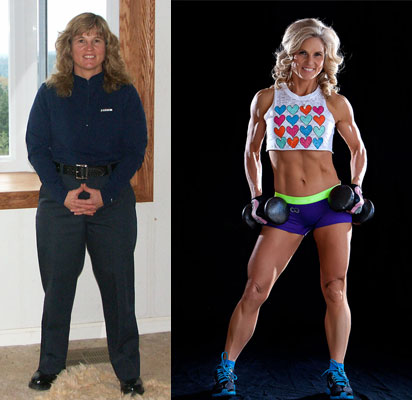
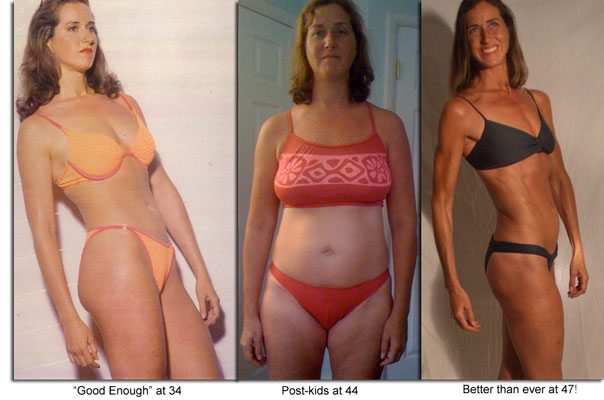


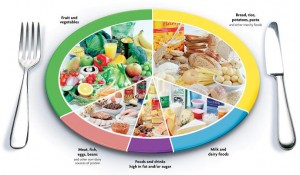

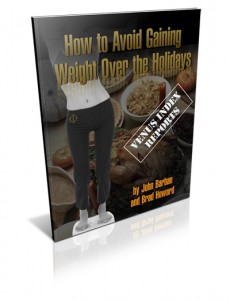
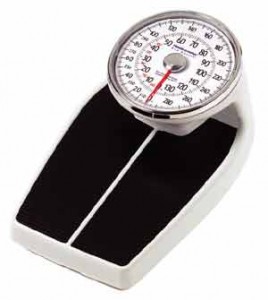

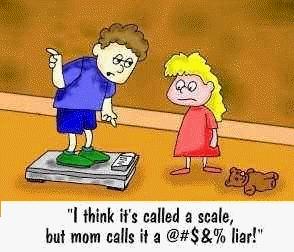
New Comments